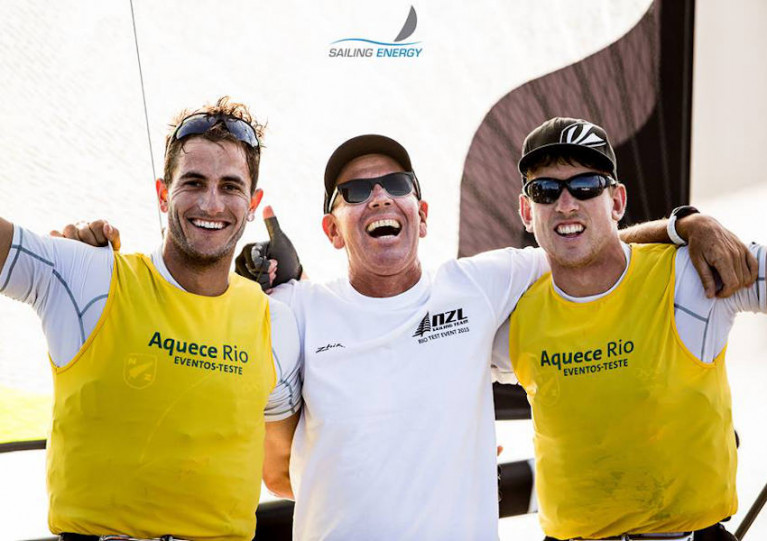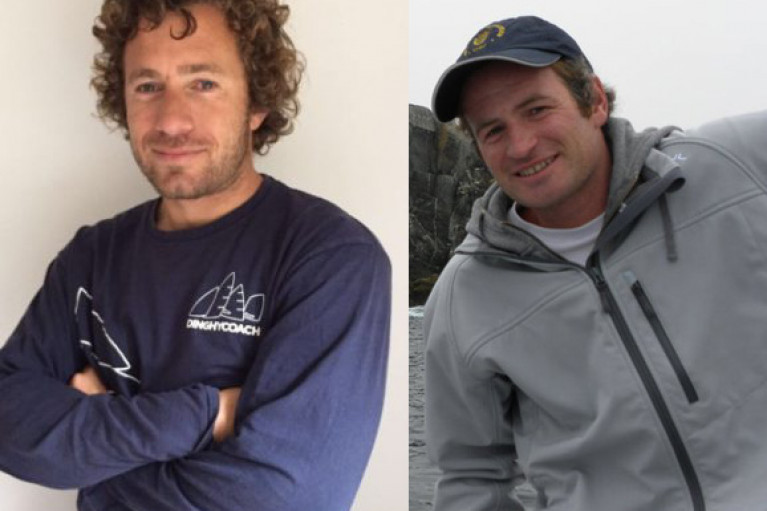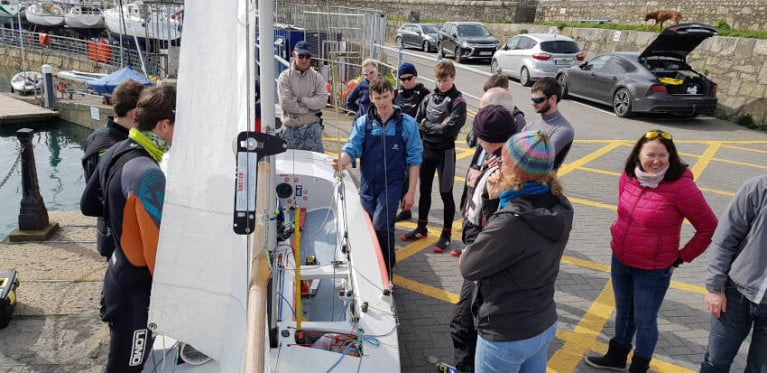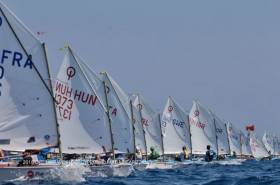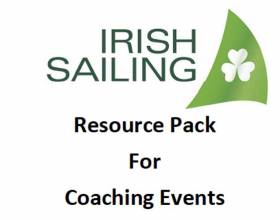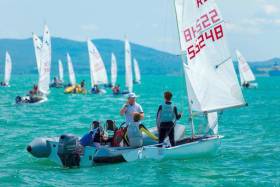Displaying items by tag: coaching
Rave Reviews for RYA Northern Ireland’s Regional Training Day and Windsurfing Clinic
More than 60 sailors, instructors and centre principals from across Northern Ireland gathered at Strangford Lough Yacht Club and Newtownards Sailing Club for a recent weekend of RYANI training.
The training day and windsurfing clinic allowed for all participants to develop their skills and learn about new RYA schemes. Ahead of what promises to be a busy season, it was an ideal way for members to learn how develop sailing and boating at their club.
Speaking on the training day at Strangford Lough lasyt Saturday (23 March), Bryan Monson from East Down Yacht Club said: “It was great day brushing up skills and meeting some other power boat instructors.”
Sunday (24 March) saw windsurfing and wing instructors running a clinic in Newtownards, including a chance for attendees to get out on the water and brush up on teaching skills, especially coaching on self-development.
Among the “hugely positive” feedback, Richard Robinson from County Antrim Yacht Club said: “It was a great day and a great chance to discuss some of the challenges to the development of wind and windsurfing and winging in NI.”
Three Open Coaching Roles at RYA Northern Ireland
RYANI is currently recruiting for two lead coach roles for the Development Academy and Team Racing as well as a Women On Water Ambassador.
The lead coach of the Development Academy provides a supportive learning environment for junior sailors within the academy, sharing their passion towards the racing pathway to the younger generation in Northern Ireland.
Meanwhile, in the Team Racing Programme, the role of the lead coach is to help deliver the programme, with structured sessions to increase the knowledge of this developing area of sailing. Team racing coaches should ideally have an in-depth knowledge of team racing rules and tactics.
The Women On Water Ambassador is expected to lead and develop the Women On Water Development Programme. By providing a supportive learning environment for women within clubs and centres, RYANI’s aim is to encourage higher participation levels, upskill people across a variety of pathways and develop a passion for people to develop in their chosen pathway.
For more details on these open roles at RYANI, see the RYA website HERE.
RYA Northern Ireland Launches Coach Development Programme
RYA Northern Ireland has announced the launch of its Coach Development Programme designed to develop a pool of coaches capable of coaching at a national level.
This free programme is inviting people already involved in coaching to apply to develop their existing skills through a series of workshops and on-the-water coaching days over the next 12-18 months.
In addition, not only will being part of the programme increase the chances of gaining paid work as an RYA coach, but members of the programme will also have free access to RYANI’s regional training day for Northern Ireland on Saturday 23 March 2024.
The RYA website has more HERE.
Olympic Sailing Coach Launches Online ‘Road to Gold’ Course to Share Secrets of Success at the Highest Level
The Olympic coach behind the success of leading sailors Peter Burling and Blair Tuke has launched a new 12-week programme to set students “on the path to world-class performance”.
Hamish Willcox will deliver the Road to Gold online course which promises to demystify the secrets of campaigning at sailing’s highest level — from boat handling and tactics to fitness and mental strength.
The course will use a combination of online video and live webinars, culminating in a test that will help students determine how to bridge any gaps in sailing and campaigning skills.
And given the achievements of America’s Cup winner Peter Burling and experienced ocean and 49er racer Tuke, Ireland’s Olympic sailing hopefuls may take some interest in Willcox’s wisdom — especially with two campaigns still seeking a precious berth at Tokyo 2020.
The full course fee is €246 but early bird bookings (until Wednesday 9 December) will save more than €80 on that price, tax included — and with a 30-day money-back guarantee. Click HERE for more details.
The latest in Royal Cork Yacht Club’s ‘Stay@Home’ webinar series is a free tactics and strategy session (for members only) this Sunday 17 May with two of the most renowned coaches in the sailing world.
Gonzalo ‘Bocha’ Pollitzer and Fernando Gwozdz, from Argentina, have an impressive haul of world and national championships to their names, from Optimists to J24s.
Many will remember Fernando as resident coach in the Royal Cork for five years in the late 2000s, coaching the likes of Richie Harrington and Séafra Guilfoyle to success in the Optimist, 420 and Laser classes.
Now Fernando and Bocha have agreed to come on board to develop youth sailing in the Royal Cork.
This first session is open to all club members, coaches and instructors — sailor or non-sailor, young or old.
And the club says pending the success of the session, there will be tailored webinar series by class in the pipeline which will supplement Ireland’s upcoming return to sailing.
For more details on the strategy seminar this Sunday evening at 7pm, see the RCYC website HERE.
Class Coaching Grant Now Open For Applications
Irish Sailing’s Class Coaching Grant for 2020 is now open for applications.
The grant allows sailing classes to apply for €400 for approved Irish Sailing coaches and €200 for non-approved coaches.
Currently approved coaches are displayed on the Irish Sailing website and will be updated regularly.
Approved coaching grants for 2019 were for the Wayfarer, E-Boat, Water Wag, 420, Mirror, IDRA, GP14, 2.4mR, Topper, Fireball, Laser 4.7, Laser Radial and Laser Standard.
Over 200 sailors benefited from the training in 2019 — 38% of whom were women and girls.
Details on how to apply, and all relevant terms and conditions, are available HERE.
Team Ireland Optimist Coaching Opportunities In 2019
#Optimist - The International Optimist Dinghy Association of Ireland (IODAI) is seeking expressions of interest from coaches interested in coaching the Irish Optimist teams at international events in 2019.
The IODAI is recruiting suitable qualified and well organised sailing coaches to lead the teams and pre-event coaching programmes for the UK, Polish and French Nationals, Europeans in June, and the Optimist Worlds in July.
For more details on these coaching opportunities see the IODAI website.
Following the incident in Dun Laoghaire last year involving Irish Sailing’s High-Performance Optimist Squad and the subsequent investigation and report, Irish Sailing established a working group to consider the recommendations of the report, assess how best Irish Sailing could address them, and to help with the implementation.
The working group comprises David Turner (National YC), Ciaran McSweeney (Monkstown Bay SC & RCYC) Brian Craig (Irish Sailing Board), Harry Hermon (Irish Sailing CEO) and James O’Callaghan (Irish Sailing Performance Director). The group set about developing a simple, practical and fit-for-purpose Safety Resource Pack for ensuring safe coaching events.
The Safety Resource Pack is intended to set the framework for the various functions and principles by which staff, contractors, volunteers and other representatives should discharge their responsibilities as an organiser of coaching events. The objective is to achieve a high standard of safety within Irish Sailing coaching events, without unduly constraining the sailing activities. The aim is not to dictate or restrict activity in any way, but to provide a framework for organisers to identify responsibilities, and make informed and finely judged decisions around safety.
The Safety Resource Pack has been tested by the Irish Sailing Performance squad training, along with club coaching events from three clubs of varying size and resources. The feedback is that the Resource Pack is simple and practical, and has been welcomed by those who have used it so far. The system is now being used by Irish Sailing’s coaching events, and it is anticipated that clubs and classes will adopt it when organising their own coaching activities.
The Safety Resource Pack identifies:
- key functions/responsibilities for organising coaching events
- protocols for dealing with emergencies
- coach pre-requisites for Irish Sailing Coaches
- a practical checklist for planning a coaching event
- a risk assessment to be used for the decision to launch
The Safety Resource Pack (and particularly the risk assessment) will be most effective as an interactive tool maintained as an ‘app’ on a phone, tablet or laptop. In this way, the decision-making process for each coaching event may be recorded online, and negate the need for paper records. Irish Sailing is currently exploring options for using Irish Sailing’s Passport system for this purpose. With some modifications to the software which will be completed in the autumn, it is anticipated that the pack will become available to organisers of coaching events as a live system. In addition, we hope to extend the pack to incorporate racing events in the future.
Irish Sailing says, although the end result is deliberately short and simple, there has been a great deal of research into other systems, both nationally and internationally, along with input from a multitude of people with relevant experience.
Irish Sailing’s New Club Coaching Programme
Ross Killian is Irish Sailing’s 420 Academy Coach, but this summer Killian is also developing a new Club Coaching programme. Afloat.ie finds out more about the Club Coaching programme and what he’s looking for.
What’s the new Irish Sailing Club Coaching Programme all about?
We know that most children learn to sail during the summer on various Irish Sailing courses, but we wanted to put a programme in place that steps up a level and teaches children how to race, and at the same time, extends their time on the water after the summer months. The aim is threefold: teach younger sailors about racing, get more clubs and coaches interested in race coaching, and extend the summer season into the autumn.
The Club Coaching programme has two parts. The first is finding suitable instructors and coaches on the ground and bringing them up to a brand new Irish Sailing certification called “Club Coach Level 1”. The second is working with the clubs to design a tailor-made programme that takes into account club size, costs, boats available, and geographic spread.
What does this mean for Clubs?
This summer we are rolling out the programme for clubs to encourage them to nominate possible coaches. I also want to work with as many clubs as possible to create their own Club Coaching programme. If Clubs can include a club coach in their offering to members, we can encourage more children to learn about racing, extend the on-the-water season for sailors, and expand the pool of coaches. For example, if you are a mid-sized club and you have seven Toppers that have sailed all summer, why not get a coach to train up to Club Coach Level 1 and offer weekend race training after all the summer courses have finished – you could extend your season for three or four weeks in September and October. If you have a smaller fleet, you could think about teaming up with another club in your region and splitting the coaching sessions. I’m here to help with creating and tailoring these programmes.
What would you like to have achieved by this time next year?
By next year I’d like to have ten clubs actively running coaching programmes, and thirty valid and practicing trained coaches who are suitable to deliver club coaching.
What are you looking forward to most about this role?
I’m passionate about coaching and passionate about sailing, and I am looking forward to working with others to deliver the best training sessions to their young sailors.
Training for the new Club Coach Level 1 will begin in the autumn. If you’d like to find out more, please contact Ross Killian at [email protected]
SB20s Stage Howth Yacht Club Coaching Clinic, Launch New Website
An opportunity to clarify your sailing decisions will be provided by the Irish SB20 class association when it stages a racing strategy clinic run in conjunction with the Howth Yacht Club Spring Warmer Series in April.
The sportsboat class has also launched a new website for the 2016 season. Click here to see the new site.
The new coaching initiative from 9-16th April will take place during HYC racing and outside assistance will be permitted in the series to facilitate coaching.
SB20 sailor Jimmy Dowling says it is a 'great opportunity to hone decision making skills under the guidance of world renowned coach, Mark Rhodes'.
Areas covered include:
● The three segments of the first beat (The Law of Before)
● Creating a starting priority list = creation of strategy = start
● 5 key areas to position at the start (with additional one extra)
● Double tacking – How, why, when
● Fleet / boat control – How, why, when, where
The cost per boat is €100
The annual SB20 class dinner will be held upstairs in the dining room of the Royal Irish Yacht Club on Friday 4th March (19:30hrs for 20:00hrs). The 3 course dinner is €35pp.


























